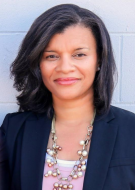Sunnie Rucker-Chang

Education:
Ph.D., Ohio State University
Sunnie Rucker-Chang is Assistant Professor of Slavic & Eastern European Studies at the University of Cincinnati.
When did you first develop an interest in Slavic, East European and Eurasian Studies?
My interest in Slavic and East European Studies arose in the 1989, when a group of students from the Soviet Union visited my 6th grade classroom to speak about Russian culture and language. When one of the students, Masha, wrote Cyrillic letters on the board, I promised myself I would travel to the country, learn that language, and maybe even teach it one day. Eventually, I did all of those things, but none of it was easy. I have had a number of challenges as an African American woman in the field of Slavic and East European Studies that have made me question my decision to remain more than once. However, as many times as I decided I’d had enough and would walk away, I always carried a passion and drive to leave an imprint on the field and create spaces for others, particularly those who have shared my experiences, to find a home in the field. When I traveled to the Balkans for the first time in 2003, the people in Serbia, Croatia, Bosnia, and Montenegro helped me to remember why I became interested in the field of Slavic in the first place. This was reinforced at one ASEEES conference in Salt Lake City when the late Ružica Popović, welcomed me warmly into the North American Society for Serbian Studies. Since then, I’ve never looked back. I am now an Assistant Professor and director of European Studies at University of Cincinnati where I teach and engage in research that advances the position, voices, and representation of minoritized communities in Central and Southeast Europe. It is my sincere hope that my work will help facilitate a space for scholars and students to reflect upon their positionalities. Through outreach and engagement, I hope to create greater spaces and opportunities for inclusion in our field.
What support have you received throughout your career (from ASEEES/other societies/federal support/etc.) that has allowed you to advance your scholarship?
As a graduate student, I received Title VI funding to study Bosnian/Croatian/Montenegrin/Serbian on a number of occasions. I have also received significant support from the Taft Research Center at the University of Cincinnati. Most recently, I received an American Association of University Women Post-Doctoral Research Fellowship to finish my current book project tentatively titled “Discourses on Blackness in Yugoslavia: Legacies and Dimensions of an Idea.”
What is your current research/work project?
 My co-authored book, Roma Rights and Civil Rights: A Transatlantic Comparison, was recently published by Cambridge University Press. This interdisciplinary book engages with comparative law, European studies, cultural studies, and critical race theory. Its central contribution is to compare the experiences of Roma and African Americans regarding racialization, marginalization, and mobilization for equality. With that project completed, I have now turned to finish my monograph in which I analyze the relevance, meaning, and uses of Blackness in Yugoslavia from the creation of the Non-Aligned Movement (NAM) in 1961, up to the contemporary post-Yugoslav setting. I am also working on two short pieces interrogating the uses of whiteness, “inbetweenness,” and “perpetual foreignness” in reference to the Chinese populations in Serbia.
My co-authored book, Roma Rights and Civil Rights: A Transatlantic Comparison, was recently published by Cambridge University Press. This interdisciplinary book engages with comparative law, European studies, cultural studies, and critical race theory. Its central contribution is to compare the experiences of Roma and African Americans regarding racialization, marginalization, and mobilization for equality. With that project completed, I have now turned to finish my monograph in which I analyze the relevance, meaning, and uses of Blackness in Yugoslavia from the creation of the Non-Aligned Movement (NAM) in 1961, up to the contemporary post-Yugoslav setting. I am also working on two short pieces interrogating the uses of whiteness, “inbetweenness,” and “perpetual foreignness” in reference to the Chinese populations in Serbia.
What does your ASEEES membership mean to you? How has your involvement with ASEEES helped to further your career?
ASEEES membership has provided me opportunities to find and get to know individuals engaged in scholarship similar to mine. Because of the annual conferences, my scholarship has benefited from much-needed exposure. These conferences have also provided critical space to meet and get to know scholars of color in the field.
What do you believe is the most important impact ASEEES has on the field?
In my opinion, the most important impact of ASEEES is that it provides opportunities for scholars from around the world to interact, workshop, and network with one another. Without the annual ASEEES conferences, and Slavic Review access, I would not have created many of my scholarly connections that I have.
Besides your professional work, what other interests and/or hobbies do you enjoy?
I thoroughly enjoy traveling abroad with my family and look forward to a time when that is possible again. I also enjoy growing my own food and patronizing the vibrant arts scene of my city. Creating opportunities for equity among underserved populations is also very important to me, so I am working to fulfill this personal mission through mentoring and service on two educational non-profit boards.
